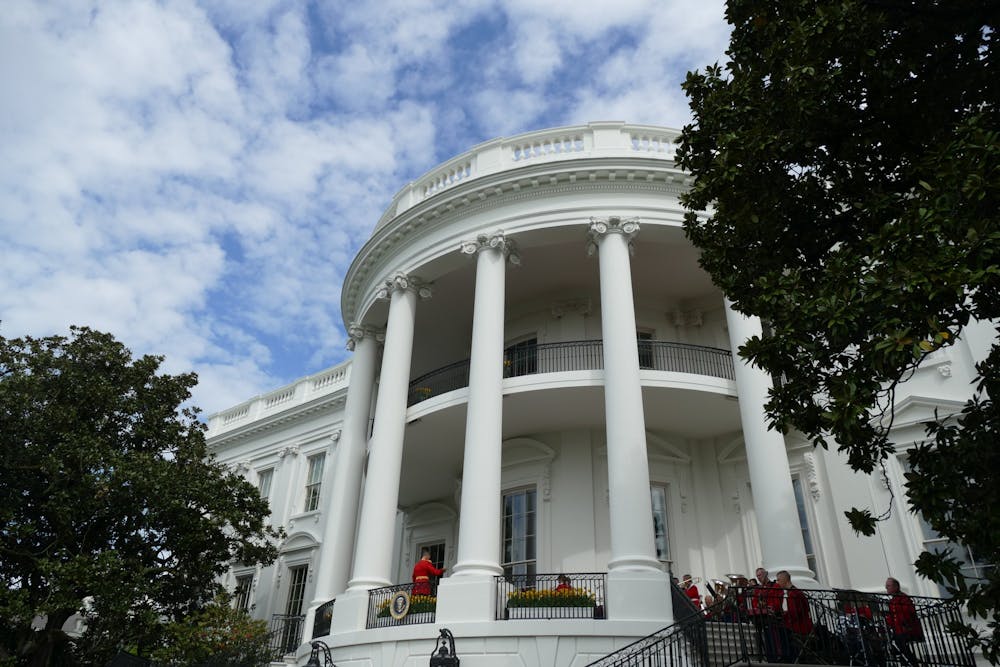Fourteen Iraqi civilians were killed and 24 more wounded Sept. 16, 2007 when Blackwater security contractors opened fire on the crowded Nisour Square in Baghdad. This unprovoked massacre occurred amidst the chaotic and ethically dubious backdrop of the War on Terror. Although this incident was perpetrated by Americans, the United States remained determined to extend to these Iraqis at least some semblance of justice. The Department of Justice and FBI thoroughly investigated the massacre, and it was in a federal courtroom in 2014 that four Blackwater security guards were convicted for their involvement in these heinous acts. But thanks to the 45th President of the United States, all four war criminals have received full pardons. To say that former President Donald J. Trump showed a blatant disregard for human rights would be an understatement. The past four years have seen the United States withdraw from the Human Rights Council, sanction the International Criminal Court and turn a blind eye to the dismemberment of a journalist. This sickening dereliction of duty poses significant challenges for the new administration, yet it is incumbent upon President Joseph R. Biden Jr. to demonstrate to the global community that the United States still values human rights.
Thankfully, then-candidate Biden told the New York Times that “human rights will be at the core of U.S. foreign policy.” This determination is both refreshing and in increasing demand globally. As Biden embarks on the first days of his presidency, the administration will need to develop responses towards a plethora of growing humanitarian crises including the genocide of the Rohingya, Chinese repression of Uighurs and the growth of authoritarianism. It is very unlikely that Biden will be a panacea for all the evils and ills that currently confront the world. However, at a minimum, an administration with the gumption to lodge meaningful and spirited rebukes against the worst human rights abusers will help set a standard that such acts are not to be tolerated.
Despite the absence of American leadership over the past four years, some nations have taken up the mantle of international human rights. These strides will greatly aid the Biden administration in its attempts to advance global accountability. Countries such as Belgium and Spain have increasingly used the principle of universal jurisdiction to arrest and try human rights abusers. Additionally, nations have turned to the International Court of Justice as an avenue to charge entire governments for crimes against humanity. These developments will hopefully inspire a sense of cautious optimism amongst the Biden foreign policy team should they seek to reshape American diplomacy into a force for global good.
If Biden’s respect for human rights is genuine, he has a broad set of policy options at his disposal. America is an economic juggernaut, giving it substantial influence over the internal affairs of other countries. The Biden administration should harness this power to punish human rights abusers and reward those who make improvements. This can be accomplished by making arms sales and foreign aid contingent upon a recipient nation’s adherence to international law and democratic reforms. Given that the largest recipients of such aid are nations like Nigeria, Saudi Arabia and Egypt — which are not necessarily bastions of civil liberty — conditional aid has the potential to better the lives of millions of people residing under repressive regimes. While such a policy of withholding aid may appear callous to the citizens of these countries, much of U.S. aid spending is in the form of military assistance. Furthermore, the aid that is actually allotted for humanitarian purposes is likely to be siphoned off by corrupt officials in recipient countries.
In some respects, the Biden administration will be hamstrung in its foreign policy endeavours due to the tenuous grip the Democrats have over Congress. For instance, it is unlikely that the United States will sign the Rome Statute, which would bring the United States under the jurisdiction of the International Criminal Court, or that aid to strategic allies — regardless of how dismal their human rights situation may be — will experience crippling cuts. Still, the Biden administration will have several avenues open to them that they can and must explore.
First, the administration can start by rejoining the Human Rights Council when given the opportunity in 2022. In this capacity, the United States will have the chance to stymie the influence of the authoritarian Chinese government over the Council. Additionally, the United States will have a say in the assignment of the Council’s Special Procedures mandate holders who are tasked with investigating a variety of human rights abuses. Beyond rejoining the Human Rights Council, the Biden administration should extend support to the International Criminal Court, UN-backed courts and other countries in their attempts to prosecute human rights abusers. Taken individually, none of these actions will monumentally shift the global landscape. However, consistent messaging and policy will allow the United States to rebuild its reputation by showing the world that we are firmly on the side of the persecuted and not the persecutors.
Max Bresticker is an Opinion Columnist for The Cavalier Daily. He can be reached at opinion@cavalierdaily.com.
The opinions expressed in this column are not necessarily those of The Cavalier Daily. Columns represent the views of the authors alone.







